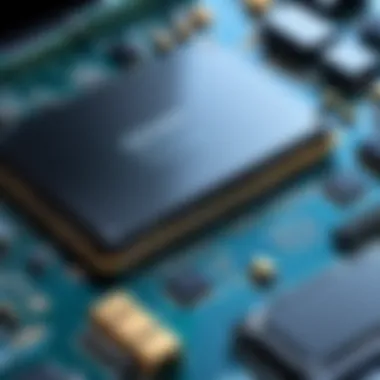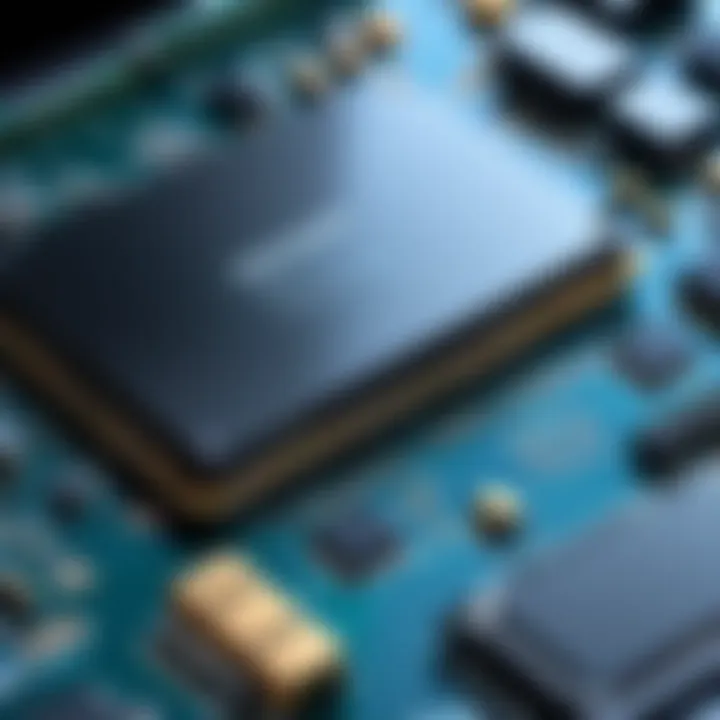In-Depth Review of Freedos Laptops: Key Insights & Specs


Intro
The rise of Freedos laptops marks an important shift in the technology landscape, particularly in terms of software flexibility and performance. Freedos, an open-source operating system that mimics traditional DOS, serves as a platform for users who favor control over their computing environment. In this analysis, we will explore the various facets of Freedos laptops, from their hardware specifications to the value they provide for different types of users.
The intention of this article is to provide a comprehensive understanding of the technical attributes, user experience, and competitive standing of Freedos laptops. This is ideal for tech enthusiasts, gamers, DIY builders, and those interested in electronic upgrades. By delving into this subject, we aim to deliver substantiated insights that can assist potential buyers in making informed choices.
Product Overview
Brief Description
Freedos laptops are a niche segment in the broader laptop market that run the FreeDOS operating system. Ideal for users looking for minimalistic, customizable environments, these laptops offer an alternative to traditional operating systems like Windows or macOS. Users often choose Freedos for its lightweight nature and the ability to run legacy software with ease.
Key Features
- Open-source software: Freedos is fully open-source and allows users to modify and adapt the system according to their needs.
- Lightweight environment: These laptops typically require fewer resources, allowing older hardware to function efficiently.
- High compatibility: Freedos supports a range of legacy programs, making it appealing for users who rely on older software.
Available Variants
Freedos laptops are available in several models, often varying from different manufacturers. Some popular models include:
- Dell Freedos Laptops
- HP Freedos Series
- Lenovo Freedos Edition
Specifications Breakdown
Technical Specifications
When evaluating technical specifications, Freedos laptops are usually equipped with:
- Processors ranging from Intel Core i3 to i7.
- RAM options that can stretch from 4GB to 16GB.
- Storage capacities varying from 128GB SSDs to 1TB HDDs.
Performance Metrics
The performance of Freedos laptops largely depends on the hardware specifications. General performance metrics include:
- Boot times averaging around 10-15 seconds.
- Responsiveness in running lightweight applications and games.
Compatibility Information
Freedos is compatible with a broad range of hardware components. Users tend to find success in using peripherals such as printers, external drives, and mice without issues.
Comparative Analysis
Competing Products
Freedos laptops compete with systems that run Windows or Linux. While these operating systems provide full-fledged user experiences, Freedos thrives on simplicity and customization.
Strengths and Weaknesses
Strengths:
- Minimal resource usage leads to faster performance on older hardware.
- Flexibility in configuration allows tech-savvy users to tailor their systems.
Weaknesses:
- Limited support for modern applications and drivers.
- Requires a higher technical understanding to optimize fully.
Price Comparison
Pricing for Freedos laptops can vary widely, depending on specifications. On average, they may range from $300 to $800, contrasting with Windows laptops in the $500 to $1500 range.
Buying Guide
Target User Profiles
Freedos laptops primarily appeal to users who:
- Have a penchant for vintage software or games.
- Prefer an open-source environment for development work.
Important Considerations
When considering a Freedos laptop, assess:
- The intended use: gaming, light office work, or software development.
- Hardware requirements based on the software you plan to run.
Insider Tips for Buyers
- Research compatibility with necessary peripherals before purchase.
- Consider seeking user communities for advice and troubleshooting support.
Maintenance and Upgrade Insights
Regular Maintenance Practices


Maintaining a Freedos laptop involves:
- Regular backups of important data.
- Keeping the system updated with the latest open-source releases.
Upgrade Paths and Options
Users can upgrade components like RAM and storage relatively easily. Checking compatibility with the Freedos environment is crucial before upgrading parts.
Troubleshooting Common Issues
Common issues may include:
- Difficulty in finding drivers for modern printers or devices.
- Slow performance due to outdated hardware.
It is essential to research and understand the capabilities of Freedos laptops thoroughly before making a purchase.
Preface to Freedos Laptops
The realm of laptops is incredibly diverse, stemming from various operating systems and configurations. Among these options, Freedos laptops have carved a niche for themselves, offering unique advantages that merit attention. This section aims to detail the keeping Freedos laptops in perspective within the tech landscape.
Understanding Freedos
Freedos, primarily an open-source operating system, is a DOS-compatible platform that provides users with significant flexibility and control. It is designed to run legacy applications and provides a suitable environment for users who prefer minimalistic computing. Unlike mainstream operating systems like Windows, Freedos emphasizes efficiency and simplicity, allowing for unique customization.
The use of Freedos in laptops stems from its lower resource demands. This can result in cost savings for consumers who do not need high-end graphics or extensive multimedia features. Additionally, Freedos enables users to install their choice of software, which is particularly appealing to purists and DIY builders who appreciate customizing their systems.
Moreover, developers focusing on retro gaming or specialized applications find Freedos advantageous, as it supports older software and systems.
Market Position of Freedos Laptops
Freedos laptops occupy a specific segment of the market, appealing mostly to a well-informed audience. These users often prioritize functionality over flashiness. Freedos laptops are typically marketed towards enthusiasts, budget-conscious buyers, and those who appreciate the open-source ethos.
The growing trend of open-source solutions has led to an increase in the visibility of Freedos in online forums and communities. Discussions on platforms like Reddit emphasize user experiences, highlighting important feedback that contributes to the reputation of Freedos laptops.
In terms of competition, Freedos faces challenges from both Windows and Linux. However, it carves out its space by offering features that appeal to specific users seeking straightforward, dependable performance. The price-to-performance ratio tends to be favorable, providing compelling arguments for potential buyers. Freedos laptops often show robust, budget-friendly performance that impresses compared to higher-cost alternatives.
In summary, Freedos laptops, while niche, present unique benefits. Their role within the technology landscape cannot be dismissed, especially as consumers continue to seek out customizable options. They serve not just as devices for casual use but as platforms for engagement among tech-savvy users.
Freedos laptops represent a gateway for user empowerment, appealing to both critics and enthusiasts alike.
Technical Specifications of Freedos Laptops
Technical specifications are crucial when assessing Freedos laptops. They define the performance, compatibility, and overall usability of the system. A well-defined specification can enhance everyday tasks, gaming experiences, and software development projects. Understanding these elements allows potential users to make informed decisions matching their requirements.
Processing Power and Architecture
The processing power of a laptop heavily relies on its CPU. Freedos laptops often come with processors from Intel or AMD. These processors have different architectures, each providing advantages for users. The Intel Core series offers high clock speeds, which is excellent for single-threaded tasks. On the other hand, AMD Ryzen processors often provide more cores at a similar price point, making them suitable for multitasking and parallel processing.
Consider CPU generation as well. Newer generations tend to have improvements in efficiency and power management. As an example, the Intel Core i5 11th generation can run applications smoother than previous generations. Users should pay attention to clock speeds, core counts, and thermal design power (TDP) when choosing a CPU for their Freedos laptop.
Memory and Storage Options
Memory plays a vital role. Freedos laptops typically support varying amounts of RAM, usually from 4GB to 32GB. More RAM means better multitasking capabilities. For gaming and more demanding applications, 16GB is often recommended.
Storage options usually include traditional HDDs and faster SSDs. SSDs enhance boot-up times and application loading. With capacities ranging from 256GB to 2TB, users should consider how much data they plan to store. Larger storage types are better for users who download significant amounts of software, media, or other files.
Important Considerations:
- RAM Size: Choose based on use cases; 8GB is adequate for basic tasks, while 16GB or more is ideal for gaming.
- Storage Type: Prefer SSDs for speed; consider hybrid options for a balance of speed and capacity.
Graphics and Display Capabilities
Graphics capabilities vary significantly. Freedos laptops may have integrated graphics or dedicated GPUs. Integrated graphics, such as Intel UHD, are suitable for basic tasks and light gaming. However, dedicated graphics cards from NVIDIA or AMD give improved performance for gaming and graphic design tasks.
Display specifications matter too. Screen size typically ranges from 13 to 17 inches. Higher resolutions, such as Full HD (1920x1080), enhance visual clarity. Panels, such as IPS, provide better color accuracy and viewing angles.
Key Features to Consider:
- GPU Type: Choose dedicated GPUs for gaming or resource-heavy applications.
- Resolution and Panel Type: Higher resolutions and IPS panels improve the viewing experience.
Understanding these technical specifications enables users to make choices that align with their needs. The right balance of processing power, memory, storage, and graphics capabilities ensures that a Freedos laptop meets both performance and usability expectations.
Performance Metrics
Performance metrics are crucial for evaluating the efficacy and reliability of Freedos laptops. This section delves into various aspects of performance, highlighting how these elements impact user experience, efficiency, and overall satisfaction with the devices.
Benchmarking Freedos Laptops
Benchmarking serves as a systematic approach to assess and compare the performance of Freedos laptops against other systems. Industry-standard benchmarks, such as 3DMark for graphics and Cinebench for CPU performance, provide a solid framework for analysis.
Key performance indicators include:


- CPU Performance: Evaluates processing speed and capabilities. A higher score typically indicates better performance for tasks demanding intensive processing.
- Graphics Performance: Assesses the laptop's ability to render high-quality visuals, crucial for gamers and designers.
- Memory Speed: Determines the efficiency of data handling, which can significantly affect multitasking capabilities.
Utilizing these benchmarks allows users to gauge how Freedos laptops perform with various workloads, enabling informed purchasing decisions.
Real-World Performance Analysis
Real-world performance offers insights into how Freedos laptops function during daily tasks. This analysis often reflects user experiences in scenarios like web browsing, content creation, or casual gaming.
Factors influencing real-world performance include:
- Operating System Efficiency: Freedos, being lightweight, often runs software with minimal overhead, improving performance.
- Hardware Compatibility: The specific components—like processors from Intel or AMD—greatly affect how efficiently tasks are handled.
- Thermal Management: Adequate cooling systems ensure stable performance, especially during resource-intensive operations.
Users often observe that Freedos laptops, while not aimed solely at high-performance tasks, can still handle general computing needs effectively. For instance, tasks like document editing or streaming can be performed smoothly.
Battery Life and Energy Efficiency
Battery life and energy efficiency are essential metrics that resonate with users seeking portability and sustainability. Freedos laptops often show commendable performance in this area, given their lightweight nature and efficient resource management.
Important considerations regarding battery life include:
- Battery Capacity: Measured in mAh, more capacity generally translates to longer usage times.
- Energy Consumption: Components like SSDs tend to consume less power compared to traditional HDDs.
In testing, many Freedos laptops demonstrate solid battery performance. Users can often expect several hours of use on a single charge, making these devices well-suited for those on the go.
In summary, performance metrics reveal essential insights into how Freedos laptops perform across various parameters, facilitating a comprehensive understanding of their capabilities.
Software Ecosystem
The software ecosystem is fundamental to understanding Freedos laptops. This aspect delves into the compatibility and functionality of software programs that operate under the Freedos environment. Exploring this topic reveals both the strengths and weaknesses of Freedos in real-world applications. For potential buyers, it is necessary to identify the software that supports their use cases, whether for gaming, productivity, or development work.
Compatible Applications and Utilities
One notable characteristic of Freedos laptops is the ability to run a variety of applications. However, the range of compatible applications can be somewhat limited compared to other operating systems. Users can employ DOS-based applications, which may include essential tools such as text editors and lightweight utilities suitable for basic tasks.
- Open-source Software: There are several open-source programs that function well on Freedos. Programs like LibreOffice and GIMP can serve productive purposes with user-friendly interfaces. However, not all versions may be optimized for Freedos.
- Utility Tools: Basic utilities such as File Manager and Text Editor provide essential functionality to users. It is important for users to seek applications that are specifically designed for or tested with Freedos to ensure proper functioning.
Gaming Performance on Freedos Laptops
Gaming on Freedos laptops presents both opportunities and limitations. Some users may find that older titles, especially those that originated in the DOS era, run smoothly without requiring modern hardware specifications. In particular, games developed for the classic DOS platform can evoke a sense of nostalgia and enjoyment.
However, modern titles usually lack support on Freedos, as current gaming standards often necessitate specific operating systems. Players should consider the following:
- Compatibility: Research is essential to confirm whether a particular game runs well under Freedos. Forums like reddit.com can be helpful in finding community discussions about game performance.
- Emulation: Users can potentially leverage emulators to enjoy newer games. Frameworks such as DOSBox can facilitate this experience but may introduce performance overhead.
- Limitations: Many graphic-intensive games may not work effectively, given the architecture Freedos operates under. The target audience should remain aware of such limitations.
In summary, gaming is feasible on Freedos laptops, though mainly limited to older titles unless configured otherwise.
Development Environment Support
The development environment on Freedos laptops supports a variety of programming languages, but it is essential to consider specific requirements and tools. Developers seeking to work within this framework should take note of some critical elements affecting their experience.
- Programming Languages: Languages like C, Pascal, and Assembly can be effectively utilized. Support for more extensive languages, such as Python or Java, may be challenging, requiring additional configuration and compatibility checks.
- Tools and IDEs: The choice of integrated development environments (IDEs) is quite limited compared to mainstream systems. Developers may need to rely on command-line tools or lightweight editors for coding.
- Community Contributions: Community forums and channels can serve as resources in troubleshooting issues, sharing tools, and enhancing programming capabilities on Freedos.
Potential developers should evaluate their project requirements carefully and determine if Freedos can meet those needs effectively.
In summary, while the software ecosystem of Freedos laptops provides distinct benefits, its limitations can affect day-to-day usability, particularly regarding gaming and software support. Understanding these factors is essential when choosing Freedos as a primary operating system.
User Experience
User experience is a crucial aspect when evaluating Freedos laptops. It encompasses how users interact with the device, the satisfaction they derive, and the ease of use. In this section, we will explore various elements that contribute to an effective user experience. These elements significantly influence how potential buyers perceive Freedos laptops.
Interface and Usability
A well-designed interface significantly enhances usability. Freedos offers a lightweight, intuitive environment that caters to diverse user needs. Users can configure their setups with ease due to the simple graphical user interface.
Key aspects of the interface include:
- Straightforward navigation: Users can quickly navigate through menus and applications.
- Customization options: Users can modify the interface to suit personal preferences, enhancing efficiency.
- Accessibility features: These features ensure that individuals with disabilities can utilize the laptops without barriers.
These factors combined contribute to a satisfying experience, making Freedos laptops a smart choice.
Customer Support and Community Resources
Effective customer support and community engagement also play a crucial role in the user experience. Freedos laptops often rely on community resources and forums for assistance and troubleshooting. This can sometimes compensate for the lack of dedicated customer service.
When evaluating Freedos laptops, consider the following support resources:
- User forums: Websites like Reddit provide valuable user insights and experiences.
- Online documentation: Comprehensive guides and FAQs can be found on the Freedos Wiki and other platforms.
- Community-driven tutorials: Users can access various user-generated content that can aid in understanding the software better.
This community-driven support can be a double-edged sword, as the quality and reliability may vary. However, it fosters a sense of collaboration and shared knowledge among users.
Installation Process and Configuration


The installation process for Freedos laptops is notably user-friendly. Most users can get started with minimal technical know-how. Freedos is designed to be straightforward, allowing for a fast setup.
Important considerations during installation include:
- Pre-installed software: Many Freedos laptops come with essential tools already in place, which simplifies the initial setup.
- Configuration options: Depending on user requirements, the configuration can be tailored to specific applications or workflows.
- Documentation: Clear and accessible installation guides enhance the overall experience, guiding users through each step.
Overall, the installation process enhances the attractiveness of Freedos laptops, particularly for those who value efficiency and effectiveness in user experience.
The user experience is not just about the hardware; it's about how users engage with technology in their daily lives.
Market Comparison
Market comparison is vital for evaluating Freedos laptops within the technological landscape. Understanding how these devices stack against competitors helps potential buyers identify their strengths and weaknesses. This comparison focuses on three key areas: Freedos versus Windows laptops, Freedos versus Linux options, and the Price-to-Performance ratio.
Freedos vs.
Windows Laptops
When contrasting Freedos laptops with Windows alternatives, the distinction primarily lies in their operating system and use case. Windows laptops dominate the market, boasting extensive software compatibility and user familiarity. Users can run diverse applications seamlessly, from office productivity software to high-end games.
However, Freedos laptops appeal to a unique audience, especially DIY enthusiasts and those interested in lightweight systems. Freedos allows users greater control over their installations and configurations. Most importantly, Freedos laptops typically come at a lower price, making them appealing for budget-conscious buyers. They offer the essential functionality without the additional cost associated with Windows licenses.
In terms of gaming, Windows laptops dominate due to comprehensive support. Freedos may have less gaming compatibility, requiring users to ensure their favorite titles work on their selected devices. Users prioritizing specific software should consider these differences carefully.
Freedos vs.
Linux Options
In the comparison between Freedos and Linux laptops, both offer flexible environments for users. Linux takes the lead in terms of software availability, as it has a robust collection of applications and support for many programming languages. This makes Linux a favored choice for developers and those looking to use advanced tools.
Freedos, being a minimal operating system, serves best when a lightweight, basic setup is desired. It can be installed quickly and requires fewer system resources, which is beneficial for older hardware. However, unlike Linux, Freedos lacks the built-in support for drivers and extensive applications, which may limit functionality in more complex tasks.
For users who prefer a minimalist approach but crave a broader application ecosystem, Linux may prove superior. However, Freedos can feel familiar to long-time MS-DOS users, providing a straightforward pathway for legacy software operation. It is essential for potential buyers to assess their primary needs—whether they lean towards advanced software use or basic functionality.
Price-to-Performance Ratio
The price-to-performance ratio is a crucial factor for anyone considering a laptop investment. Freedos laptops generally present a more favorable ratio compared to their Windows counterparts. The lower initial price paired with competent hardware enables buyers to stretch their budgets further.
- Freedos laptops: Offers competitive specifications while avoiding costly licensing fees.
- Windows laptops tend to include premium pricing due to the included operating system and software.
This divergence often means that Freedos laptops can deliver ample performance without significant financial strain. For tech enthusiasts, this makes them attractive; they can use the savings for upgrades or accessories.
Future of Freedos Laptops
The future of Freedos laptops is a topic of considerable significance in the realm of technology. As the landscape evolves, understanding potential shifts within the sector is essential for users, developers, and manufacturers alike. Freedos serves as a viable option for individuals seeking an alternative to more mainstream operating systems. Examining the trends and challenges of Freedos helps clarify the operating system's relevance moving forward.
Trends in Freedos Development
One notable trend in the development of Freedos laptops includes increasing compatibility with a wider range of hardware. As more manufacturers recognize the benefits of Freedos, they are designing systems that specifically cater to its architecture. This leads to more versatile options for consumers who appreciate choice rather than being limited to popular operating systems like Windows or various Linux distributions.
Moreover, community-driven improvements continue to play a critical role in Freedos development. The open-source nature allows developers to contribute to enhancements and expansions frequently. This results in regular updates, enabling users to benefit from new functionalities without buying a new laptop.
Another emerging trend is the focus on low-resource solutions, driven by a global push toward sustainability. Freedos laptops can run smoothly on less powerful hardware compared to their competitors, making them attractive to environmentally conscious buyers who wish to minimize electronic waste.
In summary, Freedos laptops are becoming increasingly capable of meeting modern user demands, reinforcing their position in the technology market.
Potential Challenges and Opportunities
The landscape of Freedos laptops is not without challenges. One significant hurdle is the perception of Freedos as a lesser alternative to Windows or mainstream Linux systems. This perception affects market penetration and can make consumers hesitant. Education and outreach are crucial in changing these views and showcasing the benefits of choosing Freedos—especially its customizability and lightweight nature.
Despite these challenges, opportunities abound. There's a rising demand for budget-friendly computing solutions. As users look for cost-effective alternatives, Freedos laptops emerge as suitable candidates. They offer sufficient capability for typical tasks and often come at a lower price point than competing systems.
Additionally, the gaming community has started to recognize Freedos laptops as noteworthy options for specific genres of games, particularly those that do not rely heavily on intensive graphics processing. Developers are also continuously optimizing applications specifically for Freedos, which may open doors for more advanced software in the future.
Closure
The exploration of Freedos laptops, as presented in this article, underscores the growing significance and the multifaceted nature of these devices in an evolving tech landscape. Freedos serves as a practical alternative to more mainstream operating systems like Windows, presenting unique opportunities for users. It allows one to leverage the hardware more effectively, particularly for those with a technical background or those engaged in programming and development.
The performance benchmarks and specifications discussed earlier reveal that Freedos laptops secure a commendable place in the market. They are suitable for tasks that require strong processing power and a lean system. It's important to consider factors like compatibility with applications and the users' specific needs when choosing Freedos laptops. This choice can lead to significant savings, especially given the generally lower price point compared to higher-end models running Windows or macOS.
In looking toward the future, Freedos continues to evolve and adapt, hinting at potential improvements in hardware support and software development. As the demand for customized and open-source solutions grows, Freedos laptops can expect to attract more interest. This is especially true in creative fields and for hobbyists who value flexibility.
Freedos laptops represent a confluence of affordability, performance, and openness, making them a compelling choice for the discerning user.
In summary, this analysis not only highlights the technical aspects and market viability of Freedos laptops but also conveys their place within the broader context of computing. As one considers purchasing a laptop, understanding the specific advantages and potential pitfalls of the Freedos ecosystem is essential. This knowledge empowers buyers to make informed decisions based on their individual preferences and professional requirements.
Final Thoughts on Freedos Laptops
Freedos laptops stand out in the competitive landscape of computing. They offer an intriguing alternative, especially for those who prefer less conventional systems. Users appreciate the control that Freedos provides over the software environment. This is appealing to tech enthusiasts, game developers, and DIY builders who often want to customize their experience. The absence of pre-installed bloatware is an added benefit, enhancing overall performance.
The appeal of Freedos does require some consideration. New users may find the lack of mainstream support challenging. However, the rich community resources and forums can bridge this gap, offering support and advice. This creates an engaging and resourceful network for users willing to investigate and learn. The innovative aspect of Freedos further pushes users to get their hands dirty, pushing their limits in terms of technical prowess.
Recommendations for Potential Buyers
When considering purchasing a Freedos laptop, potential buyers should evaluate several factors:
- Define Usage Needs: Buyers must clarify what tasks they intend to use the laptop for. Freedos may be better suited for programming, light productivity, or specific applications that do not rely on Windows.
- Research Hardware Compatibility: Check compatibility with essential software and hardware components. This can save time and effort post-purchase.
- Look for Community Support: Engaging with forums on platforms like Reddit can help gauge how well-supported a specific model is within the Freedos community.
- Consider Future Upgradability: Investigate the options for upgrading hardware components over time. This can significantly extend the usable life of the laptop.
- Price Point Comparison: Always compare with other laptops in the same price range to understand the cost-benefit ratio. Freedos laptops often provide a favorable price-to-performance metric.
In closing, the choice to opt for a Freedos laptop can lead to a fulfilling and customized computing experience. The benefits outweigh the limitations for many, especially in a landscape where specialized knowledge is becoming increasingly valuable.



